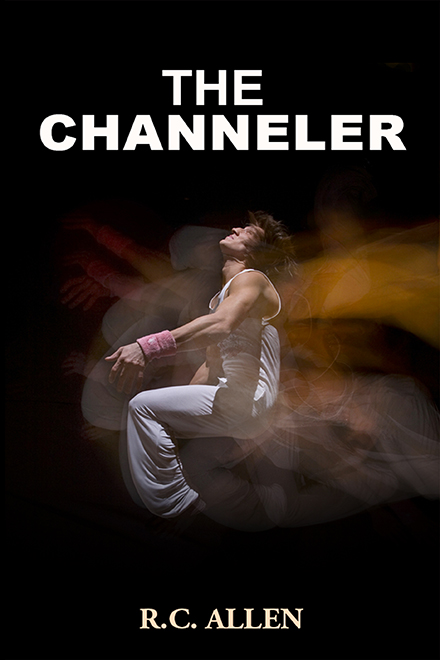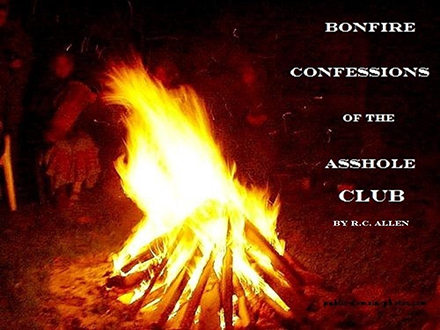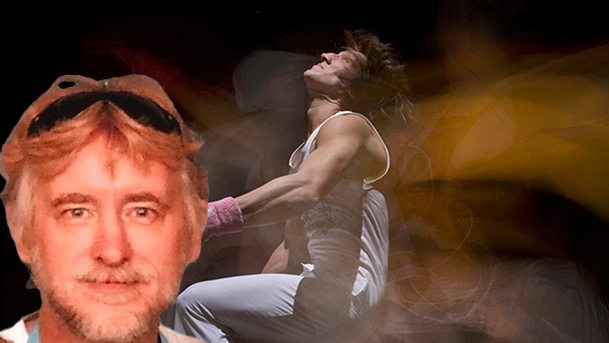Greetings, travelers! Last week, we had the wonderful opportunity to promote the most recent work of the author R.C. Allen. His book, The Channeler, had an interesting look at what happens when benign spirits possess someone, beginning from childhood, and into adulthood, where the character would have a family of his own. It’s an interesting concept that we don’t typically see in that lens. More recently, we had the chance to talk to Allen himself, to try and learn more about his book, his process, and what’s brought him here. Read on to learn more about this compelling storyteller!
Tellest: Hello R.C.! I wanted to start off by thanking you for making some time to speak to me about your new book, and all the ins and outs about your process and what makes you, you. It’s always when we’re in the middle of big projects that we try to carve out some time to chat a bit more about ourselves, and I’m sure that’s the same way that it is for you, and I very much appreciate that. I’m looking forward to learning more about you, and sharing my newfound knowledge with new fans and readers!
R.C. Allen: Thank you for talking with me. I’m extremely excited to share “The Channeler” with everybody.
T: I always like to know what it was that helped to build the foundation for the authors I interview, and I’ll typically ask that up front. What I want to know is who helped you to take your very first steps? Did you have a favorite author growing up, or was there a particular event that pushed you in the direction that would have you putting pencil to page to begin telling stories?
RCA: In the fifth grade, my teacher approached me about, well, not participating in class. She explained that my test results showed me at an eighth-grade level, and other students needed to go through the curriculum that would bore me to tears. She said I could bring a book to class every day and read, or draw, or whatever kept me satisfied (quiet). So I began writing short stories. Mostly gore, murder; the kind of stories that today would probably put me on a list somewhere for the adults to keep an eye on. From there it became a lifelong affair with storytelling.
T: Have you ever thought about those short stories that you wrote in your youth and wondered what it would be like to put a present-day R.C. Allen spin on any of them?
RCA: Wow, that’s actually one I never thought about. Honestly, the only one I remember is a group of wax figures that came to life at night and killed people. Almost like Night at the Museum, many years prior. I’m not sure I could revisit that one, but you never know…
T: You’ve got one other book that you’ve published, and we’ll get to that in a bit, but even before that, you had your newspaper reporter gig. What is it like jumping from reporting on the truth to telling a story that may be more grounded in fiction?
RCA: With journalism, you’re always in the moment. You’re doing the story you’re assigned, meeting your deadline, and then off to the next story. You’re trained to give only the very basic facts to keep the article flowing. With a novel, you have to paint a much more broad and detailed picture of the story, characters and surroundings. Sometimes I have to catch myself and “flesh up the story,” describing the environment, or thoughts in a character’s head. It’s not necessarily an easy transition from journalist to fiction writer.
T: At this point are you still engaged in journalism, or have you left that behind? Is there something more appealing about writing the truth, or is it more entertaining to write the lie?
RCA: Not anymore, but I’m retiring and moving to the northeast part of the country in a few years and I’ve contemplated writing a column for a local publication. Journalism isn’t quite so consuming, so it certainly has an appeal. However, there’s really nothing like ending a novel and feeling the pride of completing an entire story like that; knowing how much you put into it.
T: You mentioned that some of the appeal of journalism was that it might not have been so consuming as fiction. While longform literature can certainly be a lot of work, you do have that history with writing short stories. Can you see yourself tackling material with a more condense word count?
RCA: I think in the right setting, a series might be interesting. Creating a story, and breaking it down into parts that are doled out one at a time in some sort of column. That would be pretty cool; trying to keep them guessing.

T: Also related to your time writing while in the army, did you witness anything that you’ve carried with you for a long time? Was there any occasion where you needed to include that in the stories you’ve written, perhaps explored in a different way than you would have done so while you were reporting on it?
RCA: I was stationed in Washington, D.C. my entire four years, during peacetime, so my experiences were different from a wartime Army journalist. I became known as primarily a personality feature writer, where I would pick one person each week who was interesting, quirky, or had something unusual in their life that others would find interesting. The thing that stuck with me, and still does all these years later, were the personalities. The guy everyone knew as the fort’s plumber, but who played Santa Claus for George W. Bush every year when he was a kid. The sergeant whose neighbors hated him because his passion was the bagpipes. So what I carried with me is a desire to tell the story of interesting or oddball characters, in a way not so limited as in a newspaper article.
T: If you put yourself in the perspective where you were a personality feature writer for the characters you’ve written, who would be the one who would stick out for you the most? What do you think it would be like to interview some of your quirkiest characters?
RCA: Ha! I suppose I’d have to interview Max. I’d love to ask him which of the spirits who possessed him was his favorite, if he had one. I really tried to make some of the possessions fun, so that the story isn’t just a horror novel. He had some pretty interesting experiences during those.
T: Regarding the concept of channelers, Max had a relatively easy time of it, as most of the spirits that he channeled were of the benign variety. In your version of the universe that The Channeler exists within, is there a person who maybe received the short end of the stick, and had spirits that were a little less friendly tapping into a mortal host?
RCA: I gave that a lot of thought when I wrote “The Channeler.” I would like to think that purely evil spirits wouldn’t be able to enter our plane through a mortal, but there are those instances of exorcisms that are purported to be true stories. I could see that as a possibility, but it really didn’t fit into this story.
T: Now, let’s jump all the way to the other side of your writing journey, to your most recent story. The Channeler is a bit of an urban fantasy, and a bit of a paranormal adventure. What was it that drew you to the story, and how did you work your way through all the things that happened to Max?
RCA: We’ve all read or seen movies of people meeting ghosts. Talking to them, seeing them, or otherwise being able to communicate with them. There have been very few stories, to my knowledge, of people being possessed by them. The movie “Ghost” is as close as I can come, but then it was for mere seconds and there was no lasting impact. So I wanted a story where that happened to someone. But then, I wanted to take it further, to be realistic. How would his family react? Neighbors? Town? Would he be locked in a facility, or would somehow he be able to find some sort of “normal” life for himself? So I decided to throw it all at him, and take him through marriage, children, and then take his entire life that he worked so hard to obtain and throw a wrench into it all with a purely horrific event.
T: Most of the time when we’re seeing possession stories, they’re more in line with demonic possession (The Exorcist, Fallen, My Best Friend’s Exorcism). What do you think it is about ghostly possession that allows the experience to be told a different way?
RCA: Just the newness of it. So many stories, as you said, paint the afterlife as scary, even terrifying. Even “Beetlejuice” had scary scenes. What if you could have pleasant experiences with ghosts? In fact, the horrific aspects of the novel have more to do with his family’s capture than the possessions themselves.

T: At the end of The Channeler, things are a bit open ended. Certainly, the foundational concept of the story has enough depth to be explored further if you wanted to. But do you think Max’s story has been told enough, or is there bound to be more about him and his family?
RCA: Without giving too much away, I did intentionally leave it open, with an eye towards the future, realizing nothing is ever truly finished. Especially with the act of channeling itself. That could very well be explored further.
T: The idea of channeling ghosts indicates that in this universe that you’re spinning up in The Channeler, there are ghosts. Have you considered writing any other ghost stories, and exploring the other way that the spirit world intersects with our own?
RCA: Not yet. I kind of have the Stevie Nicks philosophy. I have several ideas stored away, and occasionally pull one out, dust it off, and finish it, like she does with her songs.
T: And I suppose another question to ask is, have you ever had your own experience in that realm? Not of writing Stevie Nicks songs, but of having a spiritual encounter of some sort.
RCA: Once, when I was a teen, I was with two very good friends in an alley, in the middle of the night. We stumbled across a “man” in some sort of coal mining gear, with a sort of flashlight on his head. He was glowing, and we seemed to have caught him off guard. He yelled “Hey!” and chased us for several blocks. We finally found an unlocked car in another alley and hid out there till we thought we were safe. There was no question in our minds that he was a ghost.
T: Alright, now let’s move to another book you wrote, from ten years ago. In Bonfire Confessions of the Asshole Club, you look at things through a bit more of a therapeutic lens. While in both stories, there’s a bit of self-realization, peeling of layers, and growth, it’s in Bonfire Confessions that you almost see the characters torn bare. Was it a cathartic experience for you? Was it a necessary one?
RCA: Yes it was (cathartic), and very personally painful for me to revisit. While it is a work of fiction, there are hints of truth, and pain, and moving beyond, that were a part of my youth. It was basically a composite of different things—some that happened in real life, some that didn’t, that caused the main character to go through a very similar experience to what I went through during my own childhood. I think it was a necessary step for me personally, to help purge myself of things that had been lingering for decades and congesting up my writing.
T: With your newer writing, are you looking for that same sense of catharsis, or are you writing from a “better” place now? I’m almost conceptualizing it like a lyricist going through a bad breakup as they’re writing their songs. Does the content that you’re writing about change depending on emotional turmoil, or lack thereof?
RCA: No, I had my cathartic first novel, and I’ve put it to bed. The others I’ve planned, and with “The Channeler,” don’t really have my real-life influence, although I do love writing about extremely dysfunctional families, which I’m an expert on, so that theme will continue in some of my writing.
T: What is next for you now that The Channeler is done? Did you find it easier to write than Bonfire Confessions, or was it a different challenge altogether?
RCA: I have one last novel that I’ve been holding onto for a while now, that I’m ready to begin on next. A revenge tale, but with a different twist. That’s the last in the vault, and over the last few months I’ve been tinkering with something new, with a fallen character who finds love and understanding in the strangest of places. As to my two published works, “The Channeler” was probably more fun, as it was completely fiction and I could go anywhere I wanted with it. With “Bonfire,” I had to be sure to make it as fictional as possible, so I didn’t hurt anyone in real life. I threw in some tidbits where people from that area would recognize, and those who knew me would remember certain…events.
T: What else are you working on these days if you’re not writing? Do you partake in any other artistic pursuits?
RCA: Well, I’ve still got a job with local government, which I’ve done in three different states. Besides that we’re raising our ten-year-old daughter and that’s a job unto itself. Artistic; not really. I do love buying wine kits and making my own wine at home.
T: There’s certainly got to be a story about a vintner who finds out the ghosts in their basement have a snobbish perspective on how wine should be made, and they think—regardless of the quality of his work—that he’s doing it all wrong.
RCA: That’s funny, and I could see it, especially since I get that reaction from mere mortal snobs all the time.

T: If someone wanted to know more about R.C. Allen, where could they go to learn about you? How do you get news about upcoming books, stories, or events to your followers?
RCA: Currently, there is the author page on Amazon, and soon I recently started up a web page that will have links to my novels, and hopefully some fun things thrown in for those who love reading.
T: R.C., I want to thank you again for taking the time to talk with me about your books, and about what’s next for you in these endeavors. It was great to learn more about what brought you to this point, and to understand how something like The Channeler came to be. I’m excited for new readers to find you, and learn more about your craft as well.
RCA: Thanks, Mike, and thanks to any who give “The Channeler” a try. I hope you’re in for a treat.
Once again, I’d like to thank R.C. Allen for taking the time to chat with us about his stories, and what’s led him to this point in his writing journey. It’s always a wonderful experience talking with storytellers who are passionate about their work, and Allen was certainly a great example of that. If you’re interested in the author’s work, we highly suggest that you check out The Channeler by R.C. Allen on Amazon today!
Michael DeAngelo
Latest posts by Michael DeAngelo (see all)
- Fantasy Promo – Quinine - July 25, 2024
- Sigil Art – Grim’s Hold - July 24, 2024
- Fantasy Promo – Light the Shadows (Under Elfhame’s Stars) - July 24, 2024
